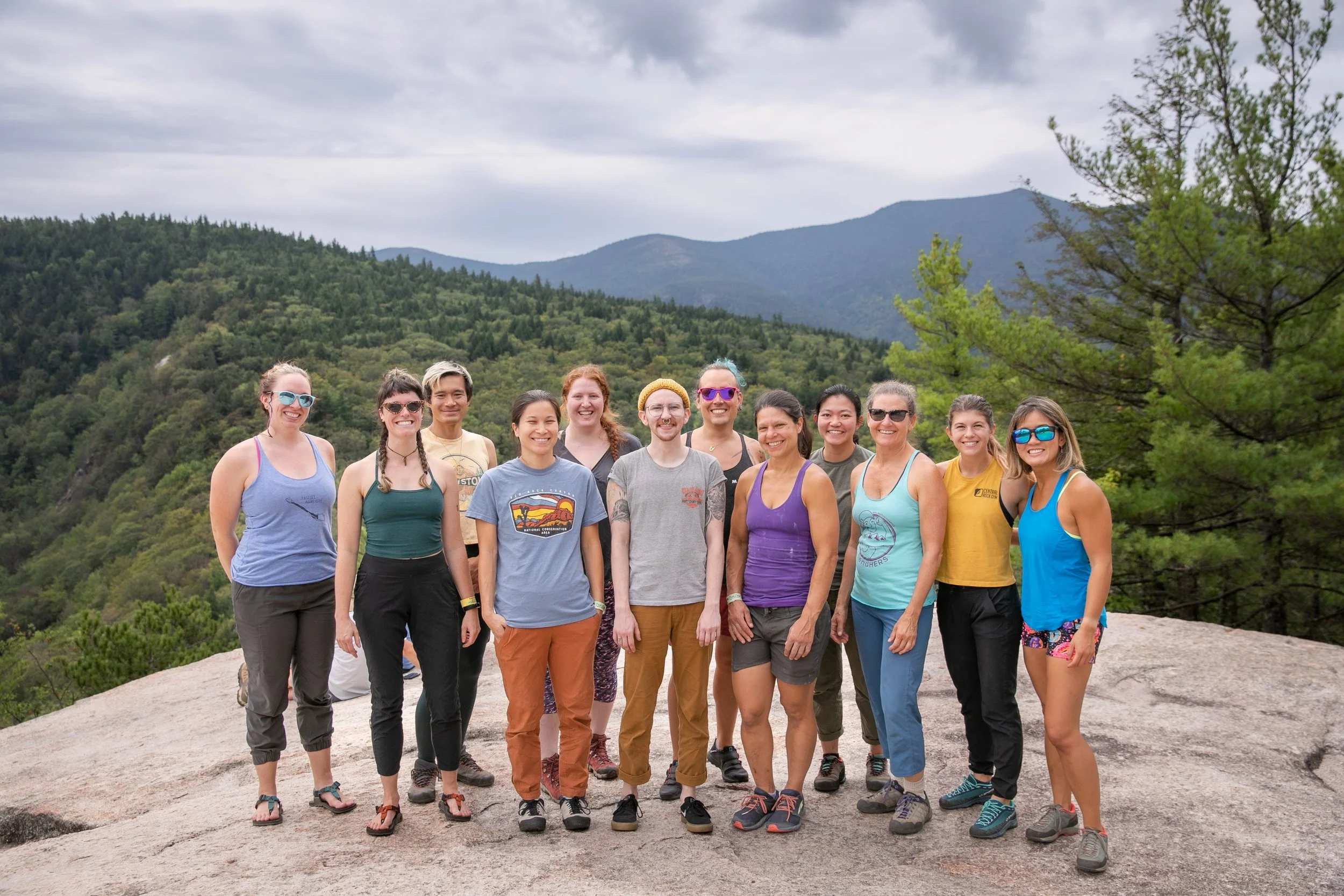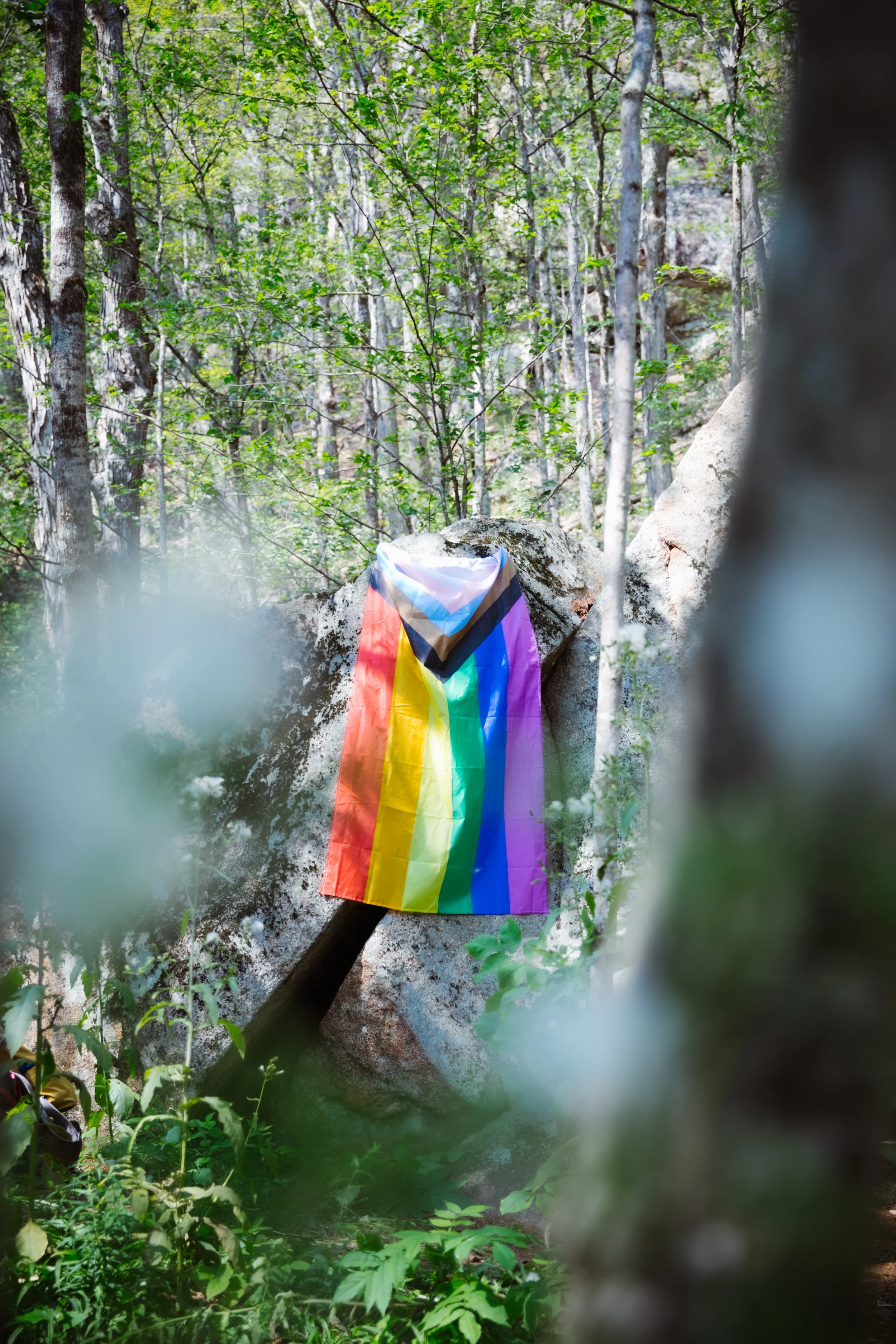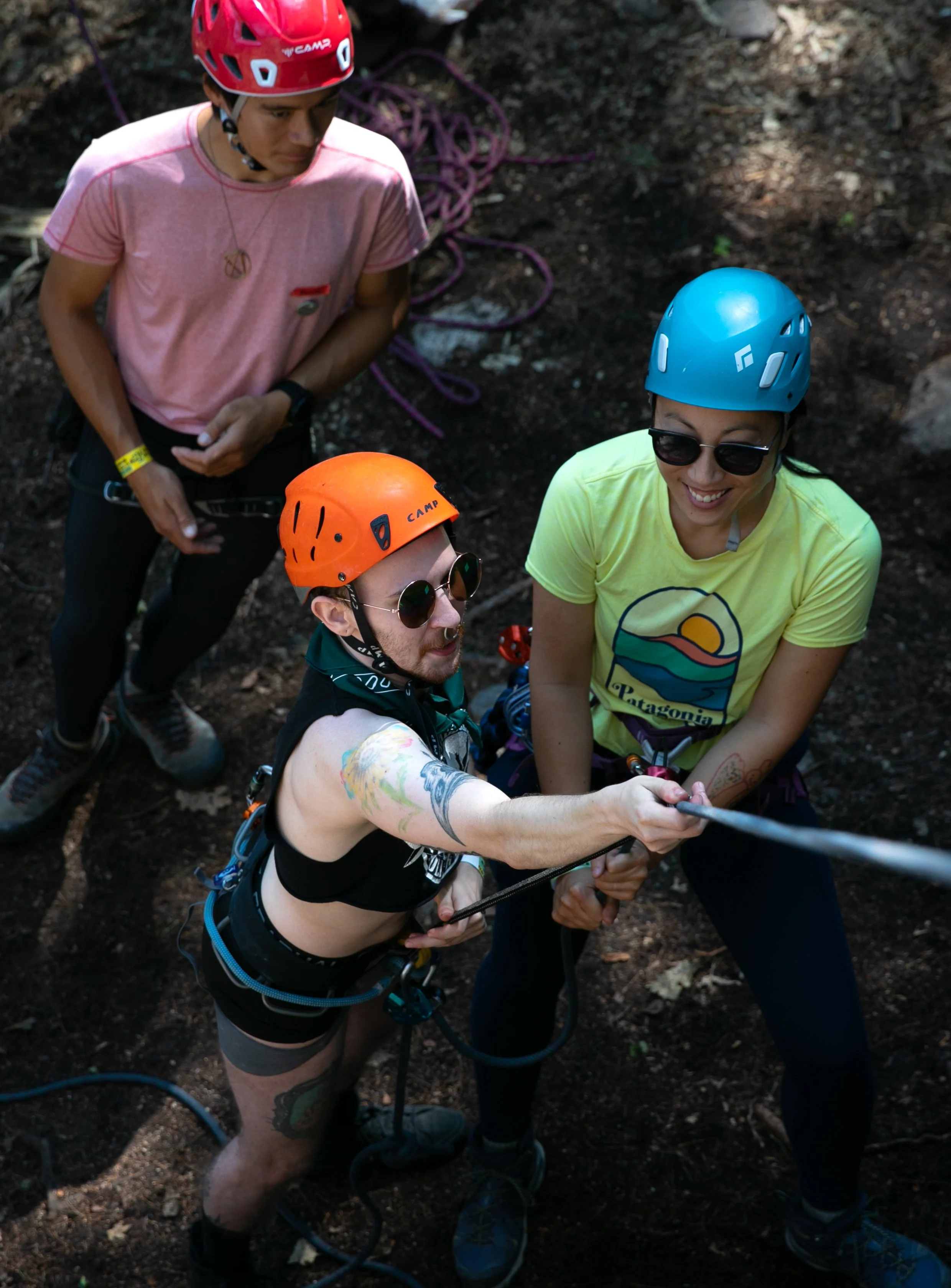Parker Reid (they/them)
Scholarship Recipient | 2022 Flash Foxy Fall Fest - North Conway
Parker is determined and ready for the next move during the affinity climbing meetup by @themegallen
Attending this year’s Flash Foxy Fall Fest was nothing short of life-changing. I will carry the memories and feelings with me as I continue to grow in my climbing and advocacy work. I knew as soon as I entered IME that it was going to be a great weekend. I was greeted at the door with excitement and free coffee, which was the perfect start to the day. I was a little anxious being surrounded by so many unfamiliar faces, especially being the only wheelchair user in the room. Despite my fears, I went up to a group of folks who were talking and loudly said “Hello Friends!”. To which I was greeted with smiles and introductions. We spent the next while chatting about where we were coming from, how long we’ve been climbing for, etc. The sheer amount of voices in the room meant there was a lot of leaning in and asking, “What?”, but being able to go up to complete strangers and be met with kindness and excitement was a good omen for the weekend ahead.
One of the coolest and most healing parts of the festival was just being surrounded by so many other trans and queer folks, as well as the peace of being in a space that is intentionally not for cis men. I was also really impressed by the intentionality of the event organizers/Flash Foxy staff around not just adding non-binary people to a women’s space, but paying a gender equity consultant and putting trans/queer folks in positions of power within Flash Foxy. It’s rare to see this kind of work being put in and it made me feel like I as a non-binary person was just as important to the space as cis women were.
Multipitch Magic group photo by @jennflemm
Staying with the theme of affinity spaces and queer joy, I had an amazing time attending the queer affinity climbing get-together. Getting to be in nature doing my favorite thing surrounded by people who look like me was truly so healing and special to experience. This get-together was also special as it was my first time bouldering outdoors and I wasn’t sure how it would go. It was very scary at first and I felt very out of my depth. I didn’t feel that way for long though. Everyone was so encouraging and supportive no matter how I did or how hard the problem was, and we all wanted success for each other. I also appreciated the little art corner where we could sit and draw, it was a nice way to take a break in the heat and fostered connection and Conversation.
Flag posted high and proudly during the affinity climbing meetups by @jennflemm
The clinics I went to were Rescue Skills and Multipitch Magic, both of which were taught by Sean and Thomas, who are both so knowledgeable and incredibly humble. With the outdoor climbing industry still so heavily cis-male dominated, it can be hard to find teachers who you can trust to not only have adequate knowledge, but also to provide answers that stray away from the “because I said so”, and the humility to communicate what they don’t know. Sean also took extra care to make sure the clinics were as accessible to me as possible and that I had what I needed to make the most of the day. I learned so many valuable skills at the clinics and appreciated the chance to get hands-on experience using what we were learning and getting immediate feedback from our instructors.
Rescue clinic in action by @jennflemm
Another part of the festival that had a deep impact on me was the panel and discussion. Despite now sharing the same identities or culture as the panelists, I was able to relate to the essence of what they have experienced around exclusion in climbing, and being the only person representing your identity. I was tearing up for a good portion of the panel because it is so rare to be in a room with so many people who know what it’s like to have one or more marginalized identities. Hearing about the panelists’ experiences and accomplishments reminded me that I belong in these spaces, and that I am capable of creating change within the climbing community.
Beautiful panelists by @themegallen
The last thing I want to touch on is event accessibility and what it was like being a wheelchair user at the event. Firstly I want to express my gratitude for the accessibility measures that were taken and the awareness of event organizers, especially Lou, who took extra initiative to include me in things like the group photo and made me feel like I was wanted in that space (also for helping me dive down steep hills and back up steep hills in the wild heat. Another piece of accessibility I was grateful for was the financial accessibility of the event. I, as you know, was one of the scholarship recipients, without which I wouldn’t have been able to attend the event. I think having those scholarships is so important for creating representation in the outdoors for people who have been historically, and presently, excluded.
There were some aspects of the festival that were inaccessible or that I felt put an extra burden on me to be able to participate. In general, navigating the event spaces meant a lot of effort not just getting to the event, but navigating the space due to steep hills, gravel, grass, lack of accessible parking next to the events held at Believe in Books. It was hard knowing that I could have done so much more and that I didn’t get to have the same experience as the other attendees because I had to spend more energy trying to get around and worrying about access. Something else that made it harder for me to participate was the lack of information ahead of time around event venues, what clinics there would be, clinic locations, schedule, etc. Being disabled and chronically ill means a lot more planning has to go into traveling and budgeting energy, and not having certain info until the couple weeks leading up to the festival or later meant I wasn’t able to take as much care with pacing myself and making more informed decisions on how I want to spend my time.
I also was kind of disappointed with how closely space all of the day’s events were, especially because I did both Saturday and Sunday clinics. I appreciated all of the free programming, but could’ve benefited from some more scheduled breaks/free time throughout the day. I was also bummed that the stage at Believe in Books wasn’t made wheelchair accessible as it meant I wasn’t able to participate in the salsa workshop. All of these things added up throughout the weekend and left me feeling a bit excluded and like my presence wasn’t as valuable as the rest of the attendees that were able to participate without accommodations.
All that being said, I still got the sense that accessibility was on the minds of the organizers and that they were aware of the less accessible aspects of the festival. I know event planning is complicated and trying to meet the needs of everyone is nearly impossible, and also feel hopeful that accessibility will become a more thought about, prioritized, and attended to piece of organizing this amazing festival. I look forward to seeing how equitable access is addressed in future Flash Foxy festivals/events.
I again would like to express my gratitude to everyone who helped organize and bring this event to life. I left on Sunday feeling exhausted, lucky, grateful, cared for, and empowered to continue showing up and pushing for accessibility in the climbing industry. This was genuinely one of the coolest things I’ve ever done and has shown me I’m capable of so much more than the world gives me credit for. It has shown me that showing up as myself is one of the most powerful things I can do. So thank you for being a part of my journey and allowing me to be a part of yours.





